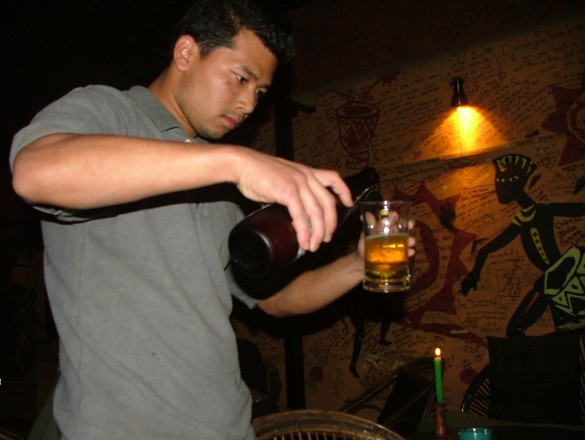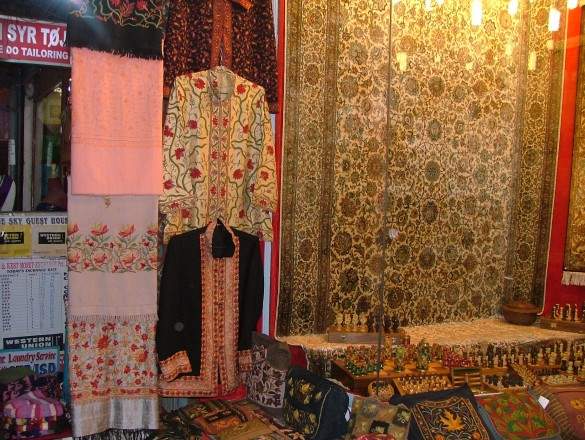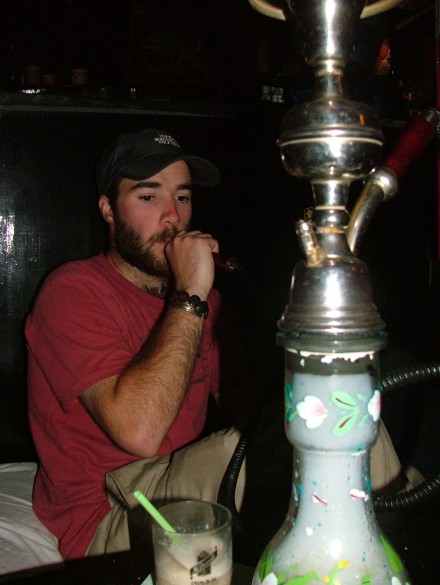The poor rickshaw driver couldn’t have had a clue as to what his potential fare had in mind when he signaled for the driver to stop. “We go to the Fire Club,” said Kyle, a cheerfully intoxicated volunteer at an orphanage out for one more outrageous night in Thamel, Kathmandu’s bouncy backpacker section of town. “But I’m driving. 2,000 [$27] rupees okay?”
After some expected waffling over the unorthodox nature of this request, the wiry older Nepali man eventually stepped down with a smile and signaled for the American man-child to take the handlebars of his oversized tricycle. Next, four of Kyle’s fellow volunteer friends hopped in, two on the seat and two on the laps of the first two. Another university-age duo held to the sides of the groaning rickshaw, which was clearly not designed to hold such mammoth loads. Even under its new and relatively sturdy stewardship, the bike precariously weaved its way down the lane, rapidly losing the two hangers on, and losing the rest of the passengers in a traffic-snarling fit of raucous laughter.
Kyle was able to turn back around after this to reconnoiter with the rest of his group of friends, where it was Kristina’s turn to play Queen of the World, having clambered onto the bonnet of a typically small and white Kathmandu taxi and then egged on the driver to drive with her on top for a spell. This he did for a few meters before coming to a rather abrupt stop, forcing his tipsy freeloader off and into the street (at least on her feet).

Ultimately, the 10 or so of us went to Fire by foot, where the playing of Lady Gaga’s “Just Dance” seemed an appropriate ode to our latest chaotic evening. As she sings: “I’ve had a little bit too much/ All of the people start to rush/ What’s going on on the floor?/ I love this record baby, but I can’t see straight anymore.”
Kyle has a big Superman complex, saying simply “I like helping people.” Once, when he saw a motorcycle get clipped by a car that just drove on, he called on the driver of our van full of volunteers to stop. We were getting back from one more heady trip to Thamel to the volunteers’ hostel, when Kyle jumped out so that he could lend a hand, running to the scene of the accident. “Go directly home. Drive only in first gear,” he said to the motorcyclist with expertise and maturity beyond his 18 years.
At a party with a young crowd—14-to 18 year olds (One 16 year old said “The ’70s are so cool!”), where the absolutely inedible Star Gold local beer, a brand rightly self-described a “strong” was being served—he cradled a wild drunk, trying to get him calmed down for the betterment of everyone.
Upon finding a bottle of a better brand of beer (Everest lager!) at the end of that night, Kyle set about attempting to smash off the top of it by banging it against as concrete curb, when a horrified Nepali admonished “Don’t do it like that!”, grabbed the bottle, and ripped off the bottle cap with his teeth. It was midnight and we were looking for a taxi to take us to the hostel, where a recent sign saying that curfew was 10pm was just put on display due to our many late—and loud—returns.
Kyle’s bravery and adolescence spectacularly collide when it comes to his taste for parkour, a non-competitive sport in which aficionados propel themselves up and down buildings and ladders, featuring jumps of distances up to two or so metres, with nothing softer than cement to land on.
On the night before Kyle and his older sister Whitney were set to wrap up their volunteering project and fly home early in the morning, a cocky, vodka-stimulated Kyle parkoured down a distance of about two metres, badly spraining both of his feet and ankles.
Indeed, while they enjoyed making a difference in their orphanage, showing their compassion for disadvantaged children, dubious luck seemed to follow the duo sometimes in overwhelming Kathmandu.
One night Kyle and I were taken by a couple of supposedly in-the-know Nepali chefs from the volunteer hostel’s canteen to one of the Nepali capital’s infamous “dance bars” which actually, we learned, are notoriously expensive for offering a two-bit onstage dance performance while hanger-on females tried to cajole the mostly male clientele into buying them overpriced drinks. The walk to the joint, down a dark, winding alleyway should have sent alarm bells running. As we had ordered only a few drinks, we were stunned to be presented by a 10,000-rupee bill, which we were fortunately able to negotiate down to “only” 5,000 rupees.

And at yet another venue, the Kyle and Whitney were charged $80 to pay a few games of pool. They were told there was a sign—in Nepali only—stating that the games were pricey here. They howled like wolves until a reasonable rate was settled upon, notwithstanding whatever was on the wall.
When I lightly teased them, saying they were the best brother-sister team since Donny and Marie, Kyle shored up his own ’70s credentials, replying “or the Wonder Twins”.
But the dynamic duo’s closest shave in Nepal was by far their throwing-caution-to-the-winds ascent to Everest Base Camp, the former kingdom’s most popular trek. Designed to be a 14-day adventure, with plenty of time for acclimatization, the intrepid couple, which felt great along more than 95 per cent of the way, had set their sights on doing the trek in half that time.
“I almost died” Whitney says matter of factly and breathlessly about her ordeal to everyone interested in hearing of her dramatic story, which anticlimactically began unraveling a mere 500 metres from Everest Base Camp, when her breath became shallow and her face started turning exotic shades of blue and purple. “My doctor told me that I would have died had I had spent more than 12 more hours at such high elevations.”
Two sturdy Sherpas carried her on a stretcher down to safer, lower elevations, where Whitney and Kyle were then helivaced to still lower grounds and better medical facilities.
Chuck, another volunteer, came to Nepal to teach English to young Buddhist monks. While the atmosphere in the great hilltop monastery in Pharping town in the Kathmandu Valley was spiritual, especially during their chanting, he was shocked to have such a high of mischief and irreverence among his charges.
His solace came in the form downing White Russians in venue after venue in Thamel, in honour of the drink of choice of the Dude, the protagonist of the cult classic film “The Big Lebowski”. Since cocktails were just as pricey as the overpriced beers, Chuck, usually a beer drinker, went for the cocktail with ferocious loyalty. On Kyle and Whitney’s last night in Kathmandu, we ordered a round of White Russians in his honour while he was on the Annapurna Base Camp trek, which he describes as drop-dead gorgeous and alone worth the trip to the new republic. The availability of White Russians in the popular Thamel joint the Northfield Cafe, though it has great Mexican grub, was a joke Chuck loved telling again and again:
“Do you have a White Russian?”
“Sorry sir, we have only Black Russians.”
“A White Russian is the same as a Black Russian, except it has milk. Ok? Could I have a White Russian?
“Sorry sir, we don’t have that.”
“Alright, could I just have a Black Russian with a side of milk?”
“Ok sir.”
“Thank you!”

In addition to the Northfield Cafe, other Thamel hotspots for volunteers as well as tourists and Nepalis wanting to get in on the action include Tom and Jerry bar for the ambiance; Sam’s for the scene and music, including reggae Saturdays; Sheesha Terrace, for the hookah and a great place for downing big bottles (manfully, they only come in big size) of the top local beers Everest and Gurkha; and the TNT bar with intimate dance floor and pulsating music. Good pizza is to be found at the Roadhouse Cafe and Fire & Ice. Meanwhile, the newly relocated Rum Doodle, though supposed to be the bomb, perhaps lost much of its vibe after pulling its roots up. As Kyle said once we arrived, said it “looks like a library” because of its quiet clientele on the rooftop open-air eatery.
More intimate and cheaper nights were to be had on the roof of the volunteers’ hostel, where rice-fueled chang, was passed around.
But as one volunteer put it, “It’s nice to have Thamel as an outlet, but that’s not what I came here for.”
Westerners in Thamel are forever asked “Hash? Hash?” or if they want to part with their cash to stock up on T-shirts with embroidered yaks, yak-bone prayer wheels, yak-cheese sandwiches or the ever-popular Tiger Balm. Their pushiness is often excessive.
But such annoyances are quite acceptable considering the many charms of this curious place called Thamel, where West tempts East and East excites West, especially for long-term travellers like volunteers who have the time and opportunity to explore and see just how deep the rabbit hole goes.